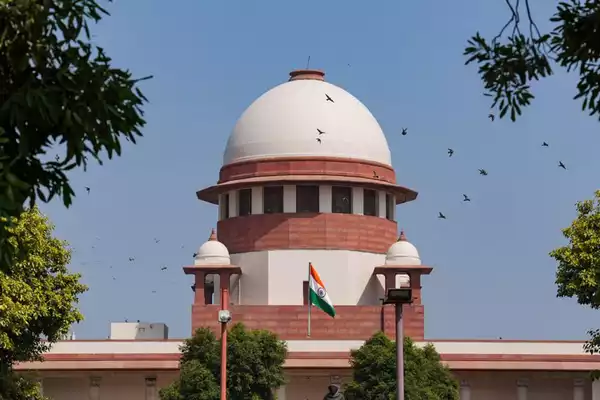The Supreme Court declares electoral bonds scheme unconstitutional including amendments, introduced through The Finance Act, 2016, and The Finance Act, 2017.
Key Points of judgement:
Anonymity to political donors:
- The scheme provided blanket anonymity to political donors, hindering transparency in political funding.
- Absolute non-disclosure of the source of political funding through electoral bonds promoted corruption.
Legal Amendments Declared Violative:
- Preceding amendments to the Representation of the People Act, the Companies Act, and the Income Tax Act, allowing unlimited political donations, are deemed violative.
- Sections of the Representation of People Act, Income Tax Act, and Companies Act were amended to remove restrictions on political parties’ disclosure of contributions.
- The court highlights the infringement of voters’ right to information under Article 19(1)(a) of the Constitution.
Corporations’ Unrestrained Influence:
- The judgment underscores that the electoral bonds scheme and amendments allowed the “unrestrained influence of corporates in the electoral process.”
- Contributions by companies were viewed as business transactions with the intent of securing benefits, creating economic inequality in the political landscape.
- The scheme disproportionately favored large corporations over ordinary citizens, affecting the principle of ‘one person, one vote.’
Economic Inequality and Violation of Political Equality:
- Scheme promoted economic inequality, giving financial power to corporations over ordinary citizens.
- Violation of the principle of free and fair elections and political equality.
Critical Amendments and Their Impact:
Pre-Amendment Scenario
- Contribution Disclosure: Before the Finance Acts, political parties were mandated to declare all contributions exceeding Rs 20,000 without exceptions.
- Donation Limit: Corporations faced a cap, contributing a maximum of 7.5% of their average net profits from the preceding three years in a financial year.
- Income-tax Act: Section 13A(b) of The Income-tax Act says that a political party shall not include voluntary contributions as part of its total income, but it is required to maintain a record of all contributions received that are above Rs 20,000.
Amendments by The Finance Act, 2017
- Section 29C (Representation of People Act): The Finance Act, 2017, amended the RPA, introducing an exception to Section 29C.
- It exempted donations through Electoral Bonds from the requirement to declare contributions exceeding Rs 20,000.
- Section 13A (Income Tax Act): Changes exempted political parties from maintaining a record of donations received through Electoral Bonds.
- A new Section 13A(d) mandated donations exceeding Rs 2,000 to be given through specified methods, including Electoral Bonds.
- Section 182 (Companies Act): Removed the cap on corporate donations, allowing unlimited and anonymous contributions.
- Loss-making companies and government companies allowed to contribute, ignoring potential harm.
What was the Electoral Bonds Scheme?
- Electoral bonds function as money instruments, available for purchase by companies and individuals in India.
- Electoral bonds are interest free bearer banking instruments resembling promissory notes, lacking buyer or payee names.
- Citizens or companies could purchase bonds in denominations of ₹1,000, ₹10,000, ₹1 lakh, ₹10 lakh, and ₹1 crore for donation to political parties.
- Bonds could only be encashed through authorized banks, with the State Bank of India being the sole authorized bank.
- The scheme was introduced to cleanse the system of political funding and enhance transparency.
Key Features
- Anonymous Donations: The crucial feature of electoral bonds is anonymity, as the donor’s name and details are not mentioned on the instrument.
- No Purchase Cap: Individuals and companies face no limitations on the number of electoral bonds they can acquire.
Operational Mechanism
- KYC-Compliant Account: Purchases are made through a KYC-compliant account.
- Political Party Eligibility: Every political party under Section 29A of the RP Act, securing at least 1% of votes in recent Lok Sabha or State elections, is allotted a verified account by the Election Commission of India (ECI).
- Bond Deposits: Parties can deposit bond amounts in their verified accounts within 15 days of issuance.
- Unencashed Bonds: If not encashed within the stipulated period, unutilized bonds are deposited into the Prime Minister’s Relief Fund.
Purchase and Availability
- Limited Purchase Periods: Electoral bonds are generally available for purchase during ten-day periods at the beginning of each quarter (January, April, July, October).
- Extended Period during Elections: An additional 30-day period, determined by the Central Government, is specified during Lok Sabha election years.
Ref: Source
| UPSC IAS Preparation Resources | |
| Current Affairs Analysis | Topperspedia |
| GS Shots | Simply Explained |
| Daily Flash Cards | Daily Quiz |



